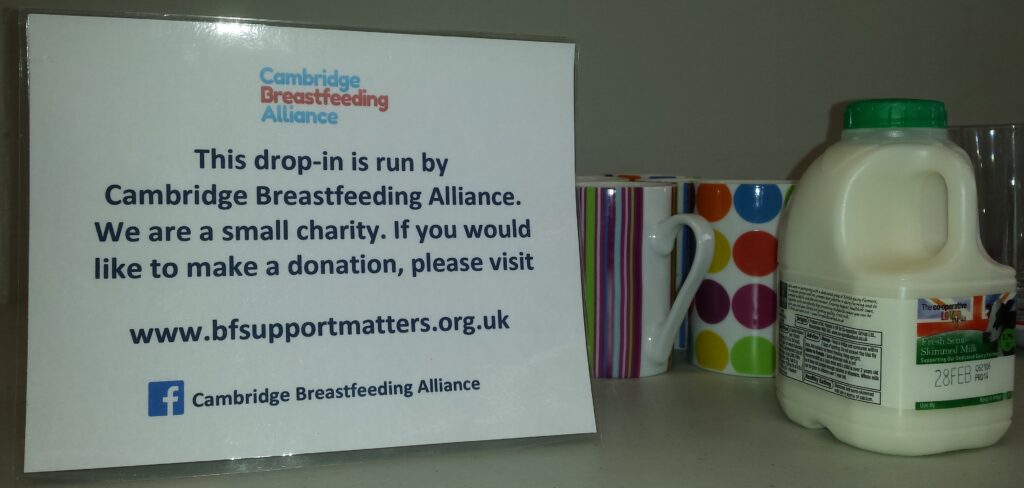We are proud to host this blog post by our friend Amy Brown. Professor Amy Brown is an Associate Professor in Child Public Health in the Department of Public Health, Policy and Social Sciences at Swansea University, UK. Her research explores the psychology of maternal and infant health and well-being, particularly during the first 1001 days of pregnancy and the first two years of life. She has a particular expertise in infant nutrition, but her research also explores the wider yet inter related issues of normal baby behaviour, sleep, parenting and postnatal depression. Amy is the author of Breastfeeding Uncovered, one of the most influential and far reaching books on breastfeeding in recent years, and her next book, The Positive Breastfeeding Book: Everything You Need To Feed Your Baby With Confidence is out soon.
Somehow, it’s summer again, and with it World Breastfeeding Week. To change seasons, plagiarise (and apply creative licence to), some well-known song lyrics, I ask ‘So this is World Breastfeeding Week, and what have you done?’…

If you’re a breastfeeding supporter, I bet you have a long list. A mother helped here, a social media conversation there … real differences made in many individual mothers’ lives. But if you are in a position to really change things on a large scale? What if you were in a high up strategic post in health? In government? Leading a major organisation? Can I ask what you’ve done to make the world a little more breastfeeding friendly this year?
Because although down here on the ground, many breastfeeding supporters are running themselves ragged day in day out, those with the real power don’t appear to have made major changes in the last year. In fact, instead, many, many places around the UK have seen major cuts to their breastfeeding support services as funding is withdrawn.
Of course, on the surface governments around the world promote breastfeeding. Each has a policy encouraging mothers to breastfeed. But what use is policy to a mother crying in pain and unable to get help because her local council has cut breastfeeding support services? What use is a policy to a mother who can’t get an answer for her low milk supply? What use is a policy to a mother who can’t get a straight answer over her medication? Policies mean nothing unless they actually actively make things better. With some notable exceptions, politicians just don’t seem to get it.
Some governments have breastfeeding strategies, but what good is a strategy unless it actually changes anything? Many mix up strategies with instruction, simply stating that women should be supported to breastfeed, without actually doing anything to support them. Others have great ideas about how to improve breastfeeding rates, but without investing properly in them, they just become yet another wish list.
The same goes for organisations. Many state in theory that they are supportive of breastfeeding but cannot point to a policy. Others can show you a policy, even boast of the structures they have put in place to enable women, but when you check out their ‘state of the art breastfeeding room’ it turns out to be a stationery cupboard, and Brian from accounts is foraging for once seen paperclip supplies.
So what will it take to change their minds? For some reason the statistics don’t matter, or at least they don’t matter enough for them to actually follow through with investment. Back in 2016, the Lancet series on Breastfeeding asked ‘Why invest and what will it take to improve breastfeeding rates’? Apparently knowing that increasing breastfeeding rates would reduce the number of mothers and infants dying from preventable illnesses didn’t arouse a high enough level of interest. Maybe some wrote this off as applying to those only in developing regions. Yet economic analyses in the UK, USA, and Australia show just how much money could be saved on healthcare costs if we invested in supporting breastfeeding (spoiler: it’s certainly enough to reinvest back in those cut breastfeeding support services).
So what would make them sit up and listen?
How about if we made them realise it’s their problem? As in really, their problem that they better get on with solving? To do that we need a major shift in thinking as currently governments are benefitting from a cycle where
- Woman wants to breastfeed
- Woman isn’t given the right support (whether that is practical, social, economic)
- Woman blames herself
This is of course hugely over simplified, but what if, WHAT IF, instead of blaming ourselves, we recognised we had been majorly let down, and demanded acknowledgement and compensation for that? After all, we know that on a population level, breastfeeding protects the health of mother and baby. In any other medical situation, if your health is compromised by not getting the right care, this is taken seriously. Why not for infant feeding?
Looking more broadly at public health and the responsibility governments perceive themselves to have – and therefore the action, legislation and investment that happened – the history of the smoking ban in work and public places draws interesting parallels. Now, to be clear, I am not comparing smoking to not breastfeeding. I repeat I am not comparing smoking to not breastfeeding. Once more for those at the back, I AM NOT COMPARING SMOKING TO NOT BREASTFEEDING. What is interesting though is the potential parallel and pathway that leads governments and organisations to invest in making systems-level changes to enable an encouraged behaviour.
Smoking has been banned in public places mainly because of the established evidence that second and third hand smoke increases non-smokers’ risk of lung cancer. However, this was known for some time before this legislation was put in place. What changed however, was that once this evidence was established, individuals who were forced to experience second hand smoke could use this in lawsuits against their workplaces. Employers – and government – were starting to be held accountable, at significant cost, and thus governments started to introduce laws preventing work and public place smoking. Of course, the accompanying documentation all states it is to do with promoting health, but a key element appeared to be individuals recognising that their health was at risk and claiming financial compensation.

But that’s different you might say. Smoking and infant feeding cannot be compared! Well again see my statement above, that I am comparing the wider public health concept, not the behaviour. And no, the statistics on mortality and smoking thankfully cannot be compared to infant feeding in developed regions with clean water supply.
But think about the wider concept for a minute. What would happen if women formally complained or even sued if…
- They couldn’t get help latching their baby on in the hospital?
- They couldn’t get an accurate tongue tie diagnosis?
- Their baby lost too much weight because no one was observing them in those early days?
- They were told incorrect information that you couldn’t breastfeed whilst taking that medication?
- They were told mastitis meant the end of your breastfeeding journey?
- Their premature baby was just past the hospital guideline for receiving donor human milk?
- No one identified they had a health issue which would have affected their milk supply?
These cases may even be starting in specific areas for infant feeding. Lawsuits have arisen over a thickener added to formula for premature babies, and class action is developing over the potential impact on bone fractures and rickets of a brand of hypoallergenic formula. But what about the day to day issues – and those issues listed are sadly day to day occurrences for many women. Why is it acceptable that women are not only not getting the support they need, but getting downright inaccurate advice? Where is the comeback for that? The complaint? The change in service?
The problem is we rarely complain. We don’t want to complain about the support we didn’t receive because we don’t want to get our lovely midwife into trouble – we can see how rushed off her feet she is. How can we blame overworked healthcare professionals who aren’t properly funded or trained anyway? Far too often, health professionals are the victims of government cuts too. Breastfeeding support is the responsibility of all of us, not just midwives and health visitors.
But mainly, we don’t complain because we are too busy blaming ourselves. In recent research I conducted with over 2000 women who hadn’t been able to meet their breastfeeding goals I asked them ‘so who do you blame for that?’
The answer? Themselves.
In the majority of cases, women who were desperately hurting were turning this all inwards and blaming themselves. They felt they didn’t try hard enough. They couldn’t manage it. They didn’t push through the pain.

No, no and no! It is not the responsibility of individual women to do this alone. Breastfeeding is a team effort that should have the support right from the top through to those closest to you. Health professionals, work places, communities, family, partners – they all play a major role in determining whether breastfeeding succeeds. They all should take some responsibility when breastfeeding doesn’t go to plan.
But ultimately, they are all living and working with a structure determined by the government. The government has within its power to make changes that would make things far easier for breastfeeding women and those who support them. The government could make changes which would ultimately pay off financially for them if we are going to take a cold, economic look at this. The government could put up its hands and take responsibility instead of letting women grieve and blame themselves.
If the government wants to promote breastfeeding, they should also protect breastfeeding women. In a few short steps it could invest in breastfeeding support services. It could create more midwifery and health visiting posts. It could crack down on formula industry promotion. It could invest in better paid and longer maternity leave. It could insist that workplaces were breastfeeding friendly.
If it wanted to.
Now how do we make it want to?

And meanwhile, Cambridge Breastfeeding Alliance battles on, providing totally free, skilled support to the parents of Cambridgeshire. We are very grateful to Amy for all the work she does to support our endeavours and make the landscape for breastfeeding families more supportive and welcoming.

What a fantastic read and makes perfectly good sense
Would be lovely to go back to the fantastic support we introduced in Shropshire with all agencies providing a seamless service..BURPS were amazing!!
Like!! Thank you for publishing this awesome article.
Let’s use national breastfeeding week. To complain on mass! Let’s all write out stories in letters like amnesty does. Send them all to government. Let them feel the scale of the issue.